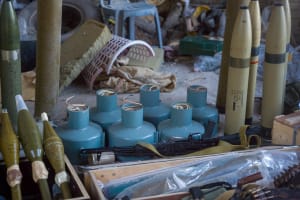Washington and Jerusalem: UNSC must condemn Iran’s attack on Israel

The State of Israel and the United States both urged the United Nations Security Council (UNSC) on Sunday to condemn Iran’s unprecedented attack on the Jewish state.
“The Security Council must unequivocally condemn Iran’s aggressive actions and call for Iran and its partners and proxies to cease their attacks,” U.S. Ambassador Robert Wood told representatives of the 15 UNSC member states.
While the deadly overnight attack failed, the senior U.S. diplomat noted that the intention of the ayatollah-controlled regime was very different.
“Iran’s intent was to cause significant damage and death in Israel,” Wood said.
Iran launched over 300 aerial munitions, including killer drones, cruise missiles and ballistic missiles. Israel, the United States, the UK, and other partners succeeded in eliminating 99% of the Iranian hostile aerial targets.
A handful of Iranian ballistic missiles succeed in penetrating the Israeli aerial defense systems, critically injuring a 7-year-old Israeli Bedouin girl in the Negev Desert and causing minor damage to an IDF airbase.
Wood further argued that Iran’s attack against Israel threatened the civilian populations in other Middle Eastern states.
“Iran’s reckless actions not only posed a threat to populations in Israel but also to other UN member states in the region, including Jordan and Iraq,” the U.S. ambassador said. He warned that “if Iran or its proxies take actions against the United States or further action against Israel, Iran will be held responsible.”
“In the coming days, and in consultation with other member states, the United States will explore additional measures to hold Iran accountable here at the United Nations,” Wood concluded. While Israel is a UN member state, it is not a UNSC member.
The UNSC has debated the Iranian attack but so far has not issued any formal condemnation.
Iran’s Ambassador to the UN Amir Saeid Iravani defended the regime's attack by claiming it to be a response to the alleged Israeli elimination of high-ranking Iranian military officials in Damascus, including a top Iranian Quds Force general who was in charge of anti-Israel terror militias in Syria and Lebanon.
However, Iranian missiles targeted the Israeli capital, Jerusalem – an area with no military bases. Video footage showed Israeli air defenses intercepting Iranian missiles over the Islamic shrine on the Temple Mount, as well as over the Israeli Knesset building.
Israeli Ambassador to the UN Gilad Erdan condemned the Iranian aggression, which he argued threatened the holy sites in Jerusalem.
“This video shows how Israel intercepts Iranian drones above the Temple Mount and al-Aqsa Mosque,” Erdan said. “To Iran, Israel’s annihilation and igniting the region is more important than Islamic holy sites.”
Under UN Charter Article 51, Israel has a legal right to respond to Iran's attack on Sunday, which formally constituted a declaration of war.
UN Sec.-Gen. António Guterres called for a de-escalation, suggesting that he is opposed to an Israeli response.
“Now is the time to defuse and de-escalate. Now is the time for maximum restraint,” he said. “It’s time to step back from the brink. It is vital to avoid any action that could lead to major military confrontations on multiple fronts in the Middle East.”
Israel has reportedly informed the United States and other allies that Jerusalem has no choice but to respond to the attack, or risk facing far more serious Iranian aggression in the future.
We recommend to read:

The All Israel News Staff is a team of journalists in Israel.

















